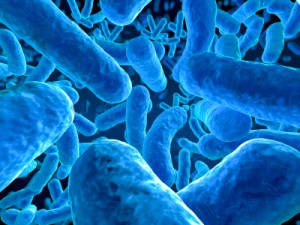
Over the last few years, human microbiome studies have revealed fascinating connections between our colonizing microorganisms and ourselves—including associations between gut bacterial populations and obesity, disease susceptibility, and even mood. The relationship between us and our microbial colonists—once considered completely benign, is now being revealed as an intricate, complicated partnership with the potential to redefine who “we” are in fundamental ways.
Two papers published back-to-back in the November 27 issue of Science add further to this growing body of knowledge—reporting a new and unexpected connection between gut bacterial species and the effectiveness of cancer immunotherapies in mice. The work suggests one reason why such treatments are effective in some circumstances, but not others. Both papers report that the presence of specific bacterial populations may be required for the efficacy of certain treatments, and raise the intriguing question “Could the composition of bacteria in the gut be manipulated to enhance the effectiveness of cancer treatments?”
Bifidobacteria influence response to tumors and treatment efficacy
In the paper, Commensal Bifidobacterium promotes antitumor immunity and facilitates anti–PD-L1 efficacy, the authors compared tumor growth in two groups of C57 black mice obtained from different suppliers and known to harbor different gut bacteria. The tumors grew more slowly in one group (JAX) compared to the other (TAC), and this difference was immune-mediated. Housing the mice together eliminated any differences, causing the JAX characteristic (slow growth) in all the mice. Transfer of fecal material from JAX to TAC mice had the same effect—making the TAC mice more resistant to tumor growth.
To test whether altering of the composition of the gut bacteria could be used as a therapy, the authors then administered JAX fecal material, alone or with PD-L1 antibodies, to TAC mice that had established tumors. Quite shockingly, treatment with JAX fecal material alone was as effective as antibody treatment alone, slowing tumor growth and increasing tumor-specific T-cell responses and infiltration of antigen-specific T cells into the tumor to the same degree as the antibody treatment. Combination treatment with bacteria and the antibody gave the best results.
Sequencing and analysis of differences in the distribution of bacteria in JAX and TAC mice suggested that Bifidobacteria may be responsible for the observed effect. In confirmation of this, treatment of mice with Bifidobacteria cultures was shown to slow tumor growth and enhance T-cell responses.
Bacteroides and anticancer immunotherapy
In the second Science paper, Anticancer immunotherapy by CTLA-4 blockade relies on the gut microbiota, the authors compared the efficacy of the monoclonal therapy ipilimumab (an anti-CTLA-4 antibody) in specific-pathogen-free (SPF) and germ-free mice, and found that treatment was not effective in germ-free mice, suggesting that the presence of bacteria played a role in treatment effectiveness.
They also looked at the composition of the gut microbiome in patients before and after treatment with ipilimumab, and showed that certain Bacteroides species were enriched after treatment. Transfer of these bacterial colonists from humans to mice improved the response to subsequent ipilimumab treatment in the mice, further establishing the link between the presence of Bacteroides sp and treatment effectiveness.
The paper concluded that ipilimumab can modify the abundance of immunogenic Bacteroides spp. in the gut, which in turn affect its anticancer efficacy.
Here are the papers:
- Sivan, A. et al (2015) Commensal Bifidobacterium promotes antitumor immunity and facilitates anti–PD-L1 efficacy. Science 350 no. 6264, 1084-1089.
- Vétizou, M. et al (2015) Anticancer immunotherapy by CTLA-4 blockade relies on the gut microbiota. Science 350 no. 6264, 1079-1084.
Isobel Maciver
Latest posts by Isobel Maciver (see all)
- 3D Cell Culture Models: Challenges for Cell-Based Assays - August 12, 2021
- Measuring Changing Metabolism in Cancer Cells - May 4, 2021
- A Quick Method for A Tailing PCR Products - July 8, 2019
